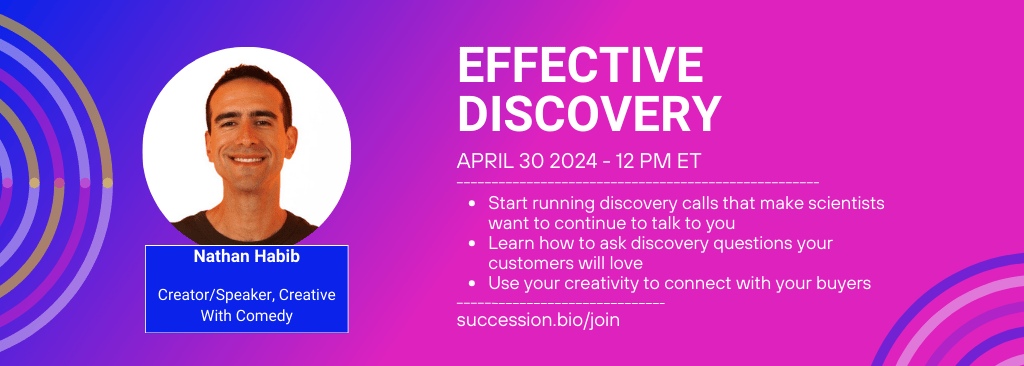Read time: 4 minutes
Welcome to the Succession newsletter where 350+ life science sales reps improve their skills in 5 minutes per week. If you’re getting value from these newsletters, we'd love it if you could forward it along to your sales colleagues. If you’re new here, subscribe below.


If you're looking to start running discovery calls that make scientists want to continue to talk to you, you won't want to miss this session.
We've got a special guest joining us. He's a comedian turned sales rep who has a unique approach to discovery and connecting with buyers.
Learn more about Nathan and follow him on LinkedIn.
April 30 at 12pm ET.

Imposter syndrome is one of the toughest things to overcome in sales.
I ran a LinkedIn poll this week that generated quite a bit of engagement and some interesting results.

I was shocked at how evenly distributed the results were. I was expecting them to be heavily swayed towards often or never. The real takeaway for me was that over 60% of sales reps have some form of imposter syndrome when selling to PhD-level scientists.
Let’s analyze this a bit deeper and then cover some techniques you can use to help overcome imposter syndrome.
Understanding Imposter Syndrome
Imposter syndrome in sales typically arises from a perceived knowledge gap between you and the PhD scientist you are selling to. You might be talking to a scientist or executive with years of experience more than you have (especially in their field).
This asymmetry of knowledge and experience presents a variety of challenges. On one hand, the prospect is wary about talking to salespeople in the first place. Not to mention being skeptical about what they can learn from a seller (especially a less experienced seller). On the other hand, the sales rep is trying to punch above their weight, quickly establish credibility, and add enough value for the buyer to want to take the next step.
Common symptoms of imposter syndrome include:
Assuming the scientist knows exactly what they need
Over-reliance on technical experts for initial conversations
Being afraid to challenge a scientist’s assumptions
Avoid asking tough questions
Worrying that your background is an obstacle
This fear can undermine your ability to perform effectively, turning potential dynamic sales interactions into stagnant exchanges that leave the prospect wanting more.
Here are a few techniques and belief systems to overcome imposter syndrome.
Embrace Your Role as an Advisor
Your primary advantage lies not in matching the scientific expertise of your clients but in your specialized knowledge of your product's benefits and applications. While they know their specific science or business, you possess critical information on how your technology can streamline their processes and help them achieve their desired results.
Prepare Thoroughly
Preparation is a key element of confidence. Before meeting a client, spend time reviewing their publications, current projects, and company page. Entering a discussion with relevant insights and informed questions shows you value their work and are serious about providing solutions. An example strategy could be: Take 10 minutes to familiarize yourself with the scientist’s latest research from their website or publications to tailor your discussion points effectively. You don’t need to be an expert, but you should have a point of view on how your technology could be applied to their work.
Case Studies and Proof Points
Use relatable success stories and data points to demonstrate how similar challenges were overcome using your products. This not only illustrates the practical application of your solutions but also builds trust in your understanding of their research. It’s important to tell the story behind the data vs just sharing the data and results. For more on telling stories in sales, watch the workshop from a few weeks ago.
Handling Technical Questions
When faced with questions beyond your scope, honesty paired with a commitment to find answers can boost credibility.

But don’t rely on your technical team too much. You have an obligation to be able to handle the first round of questions. By having that ability you will 1) build confidence and 2) provide more value to your customers.
Ask Insightful Questions
The ability to ask meaningful questions reveals a deep understanding of the scientist’s needs and challenges. Instead of merely ticking boxes, engage in a dialogue that explores their objectives and challenges deeply. As scientists you have an innate curiosity that brought you into science in the first place. Lean on that skill to ask great questions.

Active Listening
Listening is a powerful tool in building rapport. Pay close attention to the scientist's responses to tailor your dialogue and follow-up questions, showing genuine interest and understanding.

Understand Your Product Deeply
Knowledge of your product’s technical specifications, advantages, and potential applications is crucial. But it’s not enough. You have to know the problems it solves and how it can be used in different applications. If you’re able to understand how your product is positioned in the broader market of potential solutions, that’s a big value add to customers.
Know Your Customer
Identify characteristics of your ideal customer profile (ICP) and align your discussions accordingly. Understanding who is and isn't a fit for your product saves time and establishes your integrity.
Industry and Competitive Knowledge
Broaden your perspective by understanding the competitive landscape and alternative solutions. Sharing insights on industry trends and success stories can position you as a knowledgeable resource.
Don’t Let Fear and Self-Doubt Control You
The majority of sales reps feel some form of fear or self-doubt. And that’s OK. The trick is to not let it control you. Stick to what you know and be curious about your customer. Go back to the LI post and see all of the comments. There is a clear trend to those that are able to get over the fear and self doubt.



Conclusion
Overcoming imposter syndrome involves a combination of preparation, understanding your unique value, and effective communication. By focusing on these areas, you can transform your fear into a powerful drive to provide insightful, tailored solutions to your clients. Remember, your role as a sales rep is not to match the expertise of a PhD scientist but to bridge the gap between their needs and your solutions, facilitating their success and yours.


Episode 22: [Sales] The skills needed to sell in a startup with Adam Butler
The phenotype of startup hires
How to hire your first sales rep
Hiring hunters vs farmers
Considerations for your first sales role


Special Offer: If you’ve made it this far, you can use the coupon code NEWSLETTER to get 20% off an individual Succession membership.
Recommended Products & Tools: We’ve used every one of these products and can highly recommend them to you. Everything from CRMs to AI tools.
20-Day Prospecting Challenge: This is a daily prospecting challenge to help find more opportunities and exceed your quota. One email. One action. Every day for 20 days. Ready to take the challenge?
Join SAMPS: A free community of sales and marketing professionals of the sciences. They run in-person events and put on regular webinars packed with great content.
Give us feedback: If you love the content we’re putting out, could you do us a favor and take 28 seconds to write us a short testimonial? Or let us know how we can improve.


Succession for Reps: A skill development platform for life science sales reps who want to improve their sales skills, exceed their quota, and take the next step in their career.
Succession for Teams: If you’re a sales leader who’s frustrated with reps living in reactive mode and either not proactively generating new opportunities or letting prospects go dark, reach out to learn more about our team plans.
AI-Powered Prospecting: We’ll build you an AI-powered prospecting machine to book qualified sales meetings with biotech and pharma companies.
Strategy Call: Need more than training? Want help implementing and executing your sales strategy? In a 30-minute call, we will assess your company’s current situation and identify growth opportunities.


